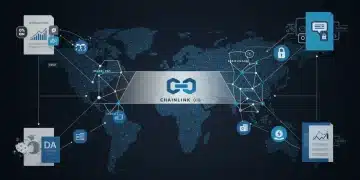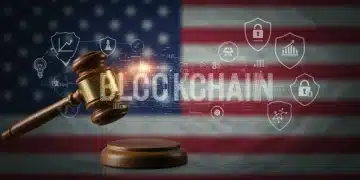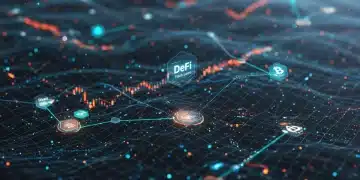DeFi Oracles: A Guide to Secure Transactions for US Investors
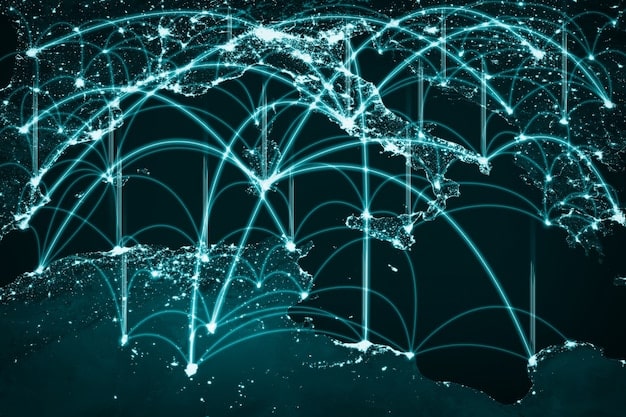
DeFi oracles are essential for secure decentralized finance (DeFi) transactions, providing real-world data to smart contracts, enabling them to execute based on accurate and reliable information for US investors.
Decentralized Finance (DeFi) is transforming the financial landscape, but its reliance on smart contracts necessitates a crucial component: DeFi oracles: understanding their role in secure transactions for US investors. These oracles act as bridges, connecting the blockchain with real-world data, and playing a vital role in ensuring secure and reliable transactions for US investors.
What are DeFi Oracles?
DeFi oracles are pivotal components within the decentralized finance ecosystem. They serve as critical bridges, connecting on-chain smart contracts with off-chain, real-world data. This connection allows smart contracts to execute actions based on information received from external sources.
Without oracles, smart contracts would be isolated, unable to interact with the outside world, limiting their utility and functionality. Therefore, understanding what DeFi oracles are is crucial for understanding the functionality and security of DeFi applications.
The Role of Oracles in DeFi
Oracles provide smart contracts with external data necessary for their execution. This data can range from price feeds and weather information to event outcomes and more. The reliability of this data is paramount, influencing the security and trustworthiness of DeFi platforms.
- Data Provision: Oracles fetch and supply external data to smart contracts.
- Execution Trigger: Smart contracts use this data to trigger automated actions.
- Increased Functionality: Oracles expand the potential applications of smart contracts, supporting a broad range of DeFi services.
The use of oracles greatly enhances the utility of smart contracts, allowing them to integrate real-world events and data, making DeFi platforms more versatile and applicable to various financial operations. This integration is essential for DeFi to function as a comprehensive financial system.
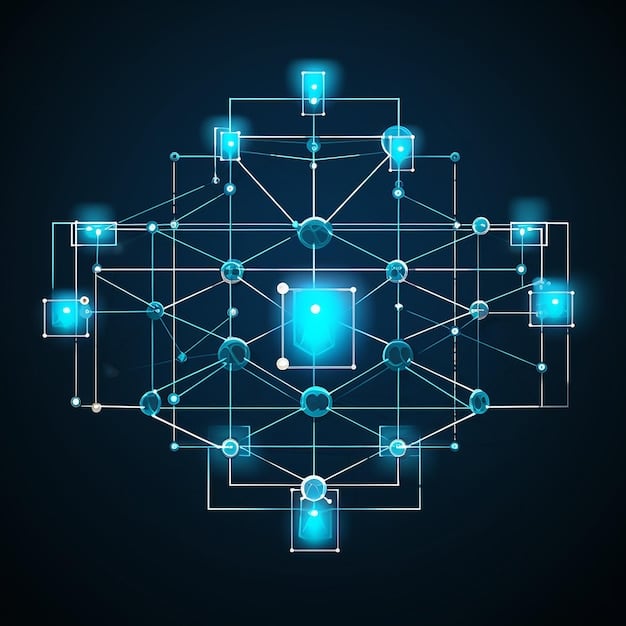
Types of DeFi Oracles
DeFi oracles come in various forms, each designed to cater to different data needs and security requirements. Understanding these types is essential for ensuring that DeFi applications are equipped with the right tools to meet their specific demands.
Oracles can be categorized based on factors such as the source of data, the direction of information flow, and the trust model they follow. This variety ensures that DeFi platforms can find the most appropriate oracle solution for their unique needs.
Centralized Oracles
Data is supplied by a single source. While this might simplify data retrieval, it also introduces a single point of failure, which can make the entire system vulnerable. Centralized oracles can be faster and easier to implement.
Decentralized Oracles
Data is aggregated from multiple sources to enhance reliability and accuracy. These oracles are more secure due to their distributed nature, reducing the risk of manipulation. Decentralized oracles provide a robust solution for maintaining data integrity and reliability.
Hardware Oracles
Hardware devices are used to provide real-world data, such as sensors collecting environmental data or IoT devices. These oracles offer a tangible link to the physical world and can provide unique data feeds that software alone cannot offer. They enhance the accuracy and reliability of data collection.
Different types of oracles ensure that DeFi platforms can select the data source that best fits their security and functional requirements. Each type has its advantages and challenges, making the selection process a critical decision for platform developers.
The Importance of Secure Oracles for US Investors
For US investors, secure oracles are paramount in ensuring the reliability and trustworthiness of their DeFi investments. The integrity of the data provided by these oracles directly impacts the execution of smart contracts, influencing the safety and profitability of investments.
Oracles act as the eyes and ears of smart contracts within the DeFi ecosystem. Therefore, the security measures implemented to protect oracles from manipulation or failure are critical. The importance of secure oracles cannot be overstated.
Mitigating Risks with Reliable Oracles
High-quality oracles can significantly reduce the risks associated with DeFi investments. By providing accurate and verified data, they help prevent malicious actors from exploiting vulnerabilities in smart contracts. Robust oracles contribute to a safer investment environment, allowing investors to engage with DeFi projects with increased confidence.
- Data Integrity: Ensures that the information used to trigger smart contracts is accurate and tamper-proof.
- Risk Reduction: Minimizes the potential for manipulation and fraud.
- Investor Confidence: Bolsters trust in DeFi platforms, encouraging broader participation in the market.
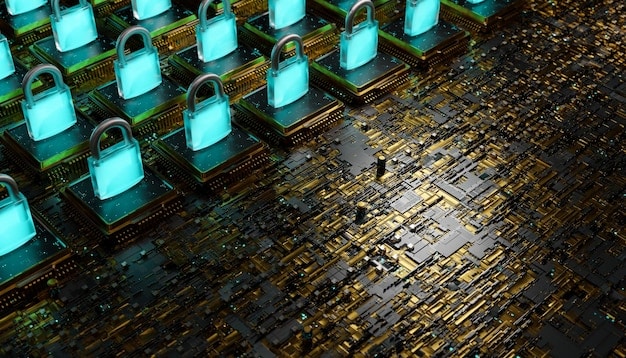
Investors must recognize the importance of secure oracles, viewing them as an essential element in the overall safety and reliability of DeFi ecosystems. They offer increased protection against the inherent risks associated with decentralized finance.
Challenges in Oracle Implementation
Implementing oracles in DeFi environments is not without its challenges. From the potential for data manipulation to the complexities of integrating with different types of data feeds, oracle implementation requires careful attention to several factors.
These challenges can range from technical issues to economic incentives that might encourage malicious behavior. Recognizing these challenges is the first step in mitigating the risks and ensuring the security of DeFi platforms.
Data Accuracy and Manipulation
Ensuring the accuracy of data is a primary challenge. Oracles must source their data from reliable providers and implement mechanisms to verify its integrity. Mitigation of data manipulation is key to protecting the functionality and trustworthiness of DeFi projects. Techniques like data aggregation, validation processes, and the use of trusted data sources can improve data reliability.
Integration Complexity
The integration of oracles with smart contracts can be complex. Different oracles use various data formats and communication protocols, which must be compatible with the smart contract platform. This can require customized solutions and careful coordination between developers and oracle providers.
Effective management of these challenges can determine the success and reliability of oracle-dependent DeFi applications. To mitigate any risks, robust oracle solutions are critical and should be carefully evaluated and implemented.
How Oracles Enhance Smart Contract Functionality
Oracles dramatically enhance the functionality of smart contracts by enabling them to interact with real-world data and events. This integration broadens the scope of what smart contracts can achieve, making them applicable to a wider range of use cases in the financial sector and beyond.
Without oracles, smart contracts would be limited to executing actions based solely on on-chain data, significantly restricting their potential. The bridge between the blockchain and the real world is what oracles provide.
Enabling Real-World Interactions
Facilitate automated payments based on real-world events. For example, crop insurance smart contracts can automatically release payouts to farmers based on weather data provided by oracles, creating a more transparent and efficient insurance process.
- Automated Transactions: Streamline and speed up traditional financial processes.
- Increased Transparency: Enhance trust by using verifiable data sources.
- Broadened Application: Support innovative use cases, such as prediction markets and decentralized insurance.
Oracles unlock capabilities that would otherwise be impossible, allowing smart contracts to adapt and respond to real-time conditions. This leads to more dynamic and responsive DeFi platforms that are better equipped to serve their users’ needs.
Future Trends in DeFi Oracles
The future of DeFi oracles is poised for significant advancements, spurred by the need for more secure, efficient, and decentralized solutions. As the DeFi ecosystem continues to grow, so will the sophistication and capabilities of oracles.
Several emerging trends will shape the future of oracles, including enhanced decentralization, innovations in data validation, and closer integration with other blockchain solutions. Keeping abreast of these trends will be essential for anyone participating in the DeFi space.
Enhanced Decentralization
The trend toward greater decentralization will lead to the development of more robust and secure oracle networks. Decentralized oracles reduce the risk of single points of failure and manipulation, enhancing the overall reliability of the DeFi ecosystem.
Advanced Data Validation Techniques
Techniques such as cryptographic proofs and enhanced consensus mechanisms will improve the robustness of oracle data. Advanced techniques ensure that the data provided by oracles is accurate and trustworthy, offering additional layers of protection against malicious actors.
The evolution of DeFi oracles will be pivotal in shaping the future of finance, paving the way for greater adoption, security, and versatility within the decentralized ecosystem. Investors and developers should embrace these trends to stay at the forefront of DeFi innovation.
| Key Point | Brief Description |
|---|---|
| 🔑 Role of Oracles | Bridges between blockchains and real-world data. |
| 🛡️ Secure Oracles | Essential for reliable and trustworthy DeFi investments. |
| 💡 Future Trends | Enhanced decentralization and advanced data validation. |
FAQ
▼
DeFi oracles provide accurate and reliable external data to smart contracts, enabling them to execute transactions based on real-world information for US investors, ensuring that the contracts respond appropriately to external events.
▼
Centralized oracles have a single point of failure, making them vulnerable to manipulation and data breaches. This can compromise the integrity of smart contracts that rely on their data, endangering investor funds.
▼
Decentralized oracles aggregate data from multiple sources, reducing the risk of manipulation and enhancing data reliability. This makes them more trustworthy as they mitigate the risks from single points of failure.
▼
DeFi oracles can provide a wide array of data, including price feeds, weather information, event outcomes, and more. The data versatility makes them essential for DeFi’s diverse functionalities, supporting various applications across the ecosystem.
▼
US investors should prioritize DeFi platforms that use secure and reliable oracle solutions. They should also conduct thorough research on the data sources and validation mechanisms employed by the oracles to reduce potential risks.
Conclusion
In conclusion, DeFi oracles are critical for ensuring secure and reliable transactions within the decentralized finance ecosystem for US investors. As DeFi continues to evolve, the role of oracles will become even more pivotal, driving innovation and broad adoption. Understanding and implementing robust oracle solutions is key to unlocking the full potential of decentralized finance and securing assets in an increasingly digital world.
